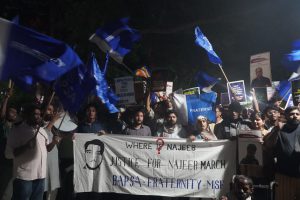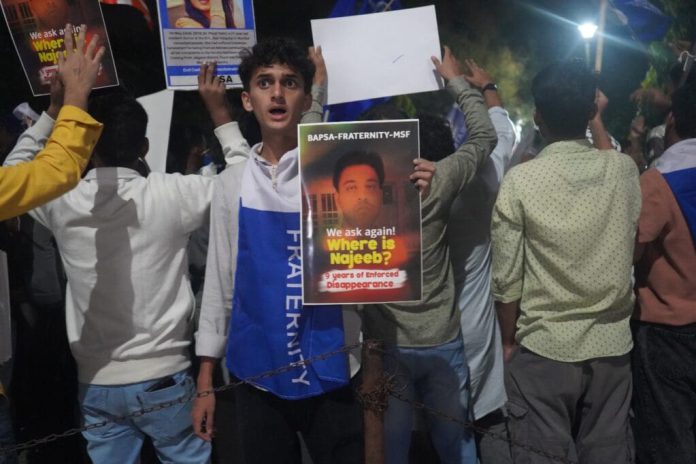Nine years on, students at JNU march once again demanding Justice for Najeeb. As calls for accountability echo through the campus, Najeeb Ahmed’s disappearance stands as a symbol of institutional failure and unyielding resistance.
By Qalam Times News Network
New Delhi | October 15, 2025
Justice for Najeeb: A Cry That Refuses to Fade
Justice for Najeeb — that’s the slogan that once again filled the air at Jawaharlal Nehru University (JNU) on Tuesday night, nine years after the disappearance of Najeeb Ahmed. Students from the Birsa Ambedkar Phule Students’ Association (BAPSA), Fraternity Movement, and Muslim Students Federation (MSF) marched through campus demanding answers to the haunting question: “Where is Najeeb?”
The call for Justice for Najeeb has outlived political seasons and administrative regimes, but what hasn’t changed is the silence of the system. Najeeb, a first-year MSc Biotechnology student from Badaun, Uttar Pradesh, went missing on October 15, 2016 — a day after he was allegedly beaten by members of the Akhil Bharatiya Vidyarthi Parishad (ABVP), the student wing of the Rashtriya Swayamsevak Sangh (RSS).
A Disappearance that Shook a Campus
Investigations by the Delhi Police, Special Investigation Team, Crime Branch, and even the Central Bureau of Investigation (CBI) led nowhere. Despite years of inquiry, CCTV reviews, and digital forensics, no trace of Najeeb was ever found. In June 2025, a Delhi court formally accepted the CBI’s closure report, leaving his family without closure or justice.
Najeeb’s mother, Fatima Nafees, said, “These agencies failed my aspirations and the idea of justice, but I still believe he is alive and among us.” Her words, steady yet sorrowful, have become the emotional backbone of the Justice for Najeeb movement.
Campus on Fire: Voices of Resistance

The march began at JNU’s iconic Ganga Dhaba and wound through the same hostels that once sheltered Najeeb, including Mahi-Mandvi — the last place he was seen. Students chanted slogans against institutional apathy and state complicity:
“Where is Najeeb?”
“Down with CBI, Delhi Police, and the Vice-Chancellor.”
“Justice for Najeeb, Justice for All.”
BAPSA JNU President Avichal Warke accused ABVP members of assaulting and threatening Najeeb, while also criticising sections of the campus left for spreading a narrative that painted Najeeb as “mentally unstable.” Warke said, “Those who call themselves progressive remained silent when a Muslim student was attacked. Their silence was complicity.”
Systemic Failure and Institutional Silence
Ambedkarite activist Yogendra called the entire episode a mirror to the state’s victim-blaming culture. “Every time a Dalit, Adivasi, or Muslim faces violence, the system blames their mental health instead of questioning the environment that drives them to despair,” he said.
Fraternity Movement’s General Secretary Mohammed Alfauz Azmi echoed similar sentiments, questioning why no apology has ever been made for the statements branding Najeeb as unstable. “If justice had been done to Najeeb, perhaps Junaid, Akhlaq, and others would still be alive,” he said, referring to victims of hate crimes.
“A Planned Conspiracy,” Say Student Leaders
Abdul Hafeez, National President of the Students Islamic Organisation (SIO), called Najeeb’s disappearance “a deliberate conspiracy to create fear among marginalised students.” He said, “The intent was to make Muslim and Dalit students afraid to exist in elite institutions.”
Hafeez praised Fatima Nafees’ courage, saying she has carried “the strength of an entire generation.” He compared Najeeb’s disappearance to Rohith Vemula’s institutional murder, calling both “questions of identity and survival in this country.”
“We Are Najeeb” — Resistance as Memory
MSF leader Shahid said the disappearance was more than a case; it was “a political weapon — the weapon of uncertainty.” He added, “Our refusal to forget is our form of resistance.”
Fraternity Movement’s Lubaib Basheer said the question “Where is Najeeb?” remains not just a cry for one student, but a moral test for the nation. “He was vilified and branded unstable — a narrative constructed to erase an Islamophobic assault. The state’s silence is complicity,” he said.
“Justice for Najeeb is justice for every student who is targeted for their identity or beliefs,” Basheer continued. “It is justice for Fatima Nafees, who has carried this fight for nine years without losing faith.”
Poetry of Defiance
As the march ended, activist Roushan Kumar recited a poem that captured the night’s spirit:
“Najeeb, you are alive — in our songs, in our hearts, in our slogans.
The administration may erase you, the police may lie,
But in every echo of JNU, Najeeb, you are alive.”
The gathering also expressed solidarity with imprisoned anti-CAA activists and Palestine, underlining a broader call for justice beyond borders.
A Mother’s Hope Endures
Even after nine years, Fatima Nafees continues to write letters to the CBI, urging searches in prisons across states. In her words: “Whenever he comes, it will not take him a second to recognize his home. He is not a child — he remembers his home.”
For the students, the demand remains simple but piercing: Justice for Najeeb.
For his mother, it remains deeply personal: hope against a state’s indifference.







